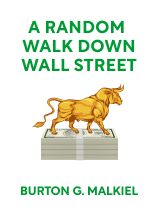

This article is an excerpt from the Shortform book guide to "A Random Walk Down Wall Street" by Burton G. Malkiel. Shortform has the world's best summaries and analyses of books you should be reading.
Like this article? Sign up for a free trial here .
What is autopilot investing? Why is it the best investment method, according to Burton Malkiel?
Autopilot investing involves buying broad index mutual funds or exchange-traded funds, rather than buying active individual stocks. This is Burton Malkiel’s preferred method of investing, as he advises building a portfolio around index funds.
Learn about autopilot investing below.
Autopilot Investing, Explained
Ideal for the prospective investor who wants to take advantage of stock-market returns but isn’t interested in specifics, autopilot investing consists of purchasing broad index mutual funds or exchange-traded funds (ETFs) rather than individual stocks or industries.
(Some of the tax differences between traditional mutual funds and ETFs are described below, but the general rule of thumb is: If you have a large lump sum that you want to invest in index funds, ETFs are generally the most advantageous choice. If you’re going to be purchasing index fund shares in smaller amounts over a longer period of time, traditional mutual funds are your best bet.)
Autopilot investing is Malkiel’s preferred method of investing. No matter how knowledgeable or engaged the investor, Malkiel advises building the core of a portfolio around index funds and only making active bets with excess cash.
The rationale behind autopilot investing is simple: Long-run returns of the S&P 500 Stock Index, which represents almost three-quarters of the value of the entire stock market, typically beat returns on portfolios designed by the most seasoned investment professionals. In short, if you were to invest in a mutual fund that holds a weighted representation of the stocks in the S&P 500, you would do better on average than trying to pick winners yourself or entrusting your money to an investment advisor.
Not only are returns better with broad market index funds, fees and expenses tend to be, too. Because index funds are passively managed—that is, they adjust their holdings more or less automatically on the basis of market values—they tend to have extremely low expense ratios (.0005% or less for some). And because index funds only trade to rebalance their weights, they incur low trading costs as well.
While the S&P 500 index funds are generally the most popular type of index fund—and they will outperform actively managed funds on average—Malkiel actually recommends that investors choose a total market index fund over an S&P 500 fund. This is because the S&P 500 index excludes smaller stocks that, historically and on average, have outperformed larger ones. Try to find a fund indexed to the Russell 3000, the Wilshire Total Market Index, the CRSP Index, or the MSCI US Broad Market Index.
Of course, as Modern Portfolio Theory teaches (see Chapter 8), diversification is the key to a successful portfolio. But one need not abandon index funds to diversify: There are funds that track REIT, corporate bonds, international capital, and emerging market indices.
A Sample Index-Fund Portfolio
If you’re interested in autopilot investing, here are some specific index funds you might consider in each of the primary asset classes (cash, bonds and bond substitutes, REITs, and stocks).
- Cash
- Fidelity Money Market Fund (FXLXX) or Vanguard Prime Money Market Fund (VMMXX)
- Bond and Bond Substitutes
- 7.5% US Vanguard Long-Term Corporate Bond Fund ETF (VCLT) or iShares Corporate Bond ETF (LQD)
- 7.5% Vanguard Emerging Markets Government Bond Fund (VCAVX)
- 12.5% Wisdom Tree Dividend Growth Fund (DGRW) or Vanguard Dividend Growth Fund (VDIGX)
- Real Estate
- Vanguard REIT Index Fund (VGSIX) or Fidelity Spartan REIT Index Fund (FRXIX)
- Stocks
- 27% US Stocks Schwab Total Stock Market Index Fund (SWTSX) or Vanguard Total Stock Market Index Fund (VTSMX)
- 14% Developed International Markets Schwab International Index Fund (SWISX) or Vanguard International Index Fund (VTMGX)
- 14% Emerging International Markets Vanguard Emerging Markets Index Fund (VEIEX) or Fidelity Spartan Emerging Markets Index Fund (FFMAX)
A short-term bond might be substituted for one of the money-market funds, and investors might include some Treasury inflation-protected securities (TIPS) among their bond holdings.’
A Note on Taxes
As always, availing yourself of tax-advantaged options is critical in investing. Whenever possible, use IRAs and ROTH IRAs to make investments. If you must hold your assets in taxable accounts, you might opt to buy tax-exempt bonds or ETFs and use tax-loss harvesting to reduce your tax burden.

———End of Preview———
Like what you just read? Read the rest of the world's best book summary and analysis of Burton G. Malkiel's "A Random Walk Down Wall Street" at Shortform .
Here's what you'll find in our full A Random Walk Down Wall Street summary :
- A comprehensive and entertaining introduction to the world of finance
- Practical investment principles that work for every skill level
- The advantages of index investing






